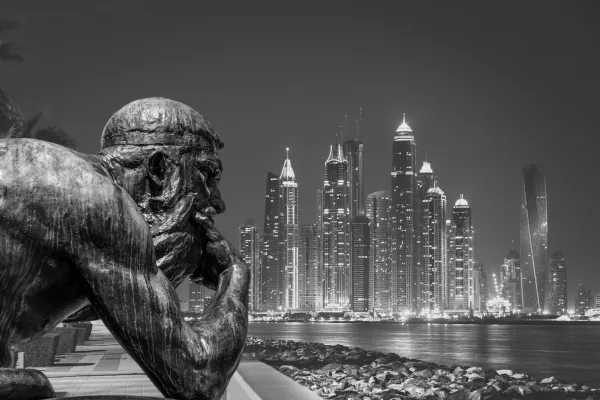
Industry-Specific Executive Challenges: Why Leadership in Dubai Demands a Different Playbook
Dubai's economic success is underpinned by rapid diversification, but this foundation brings complex leadership challenges. Executives operate within highly nuanced regulatory, operational, and cultural landscapes that differ sharply by industry. Below, credible data and statistics help illustrate why executive recruitment in Dubai is not just important—it’s a strategic imperative.
Financial Services: Navigating Dual Banking Systems
DIFC Scale and Growth: Dubai International Financial Centre (DIFC) is home to over 4,949 registered companies as of mid-2023, a 23% year-on-year increase. Among these, the number of fintech and innovation firms grew by 35% to reach 811 in the first half of 2023.
Regulatory Complexity: As of 2023, 902 fintech and innovation firms are registered in DIFC, many subject to both Islamic and conventional regulatory requirements. DIFC itself is governed under English common law, distinguishing it among regional hubs.
Fintech Expansion: DIFC’s fintech sector experienced unprecedented growth, registering a 31% increase in companies from the prior year and accumulating $3.3 billion in venture funding as of May 2024, reflecting the region’s aggressive digital transformation and international appeal.
Key takeaway: Financial leaders in Dubai must be fluent in both interest-based and Sharia-compliant finance, capable of innovating in a booming fintech sector while serving a diverse, global client base.
Healthcare: Serving Two Masters
Medical Tourism Surge: In 2023, Dubai attracted 691,478 international medical tourists, up from 674,000 in 2022, generating direct spending exceeding AED 1.34 billion and indirect revenues of AED 2.305 billion.
Infrastructure Growth: Plans are in place to add 3 new hospitals and 33 primary healthcare centres by 2033, expanding capacity and access for both local and international patients.
Economic Agenda Alignment: Enhanced healthcare service integration aligns with Dubai’s Economic Agenda D33, set to double the emirate’s GDP by 2033, with medical tourism playing a pivotal role.
Key takeaway: Healthcare leaders navigate complex demands—local accessibility and global luxury—while keeping pace with ambitious infrastructure and quality benchmarks.
Technology: Scaling Across Uneven Terrain
Digital Leadership: The UAE government has launched an AI strategy aiming for fully AI-native government operations by 2027, with over AED 13 billion invested between 2025 and 2027 for innovation and talent development.
Talent Depth: Dubai's push for digital government and AI-driven public services means executive tech leaders must not only have an agile mindset, AI proficiency, data intelligence and recruit teams adept at both global standards and regional adaptation.
Key takeaway: Tech executives bridge cutting-edge innovation with practical regional deployment, fostering hybrid teams and future-proofing operations.
Construction & Real Estate: Global Luxury Meets Local Culture
Cultural and Religious Influences: Modern residential and commercial developments are required to incorporate design elements that honor privacy, Islamic art, and cultural traditions, such as private courtyards and separate guest areas.
Regulatory Complexity: Projects must comply with stringent municipal, environmental, and free zone regulations, while delivering luxury for a multicultural, global client base.
Key takeaway: Real estate executives must balance global design expectations, local culture, and an intricate regulatory matrix.
Retail & Hospitality: Operational Multilingualism
Diverse Clientele: Dubai’s retail and hospitality industries serve customers from over 200 nationalities, requiring tailored services to address varied dietary, religious, and lifestyle needs.
Workforce Diversity: Key sectors such as textile and retail are heavily influenced by expatriates, particularly those of Indian, Pakistani, and Filipino descent, driving both operations and culture.
Key takeaway: Leaders in retail and hospitality master operational diversity, managing cross-cultural teams and customizing experiences for a cosmopolitan audience.
Manufacturing: Local-Global Balancing Act
Labour Force: In 2016, Dubai’s manufacturing sector employed over 251,000 people, combining Emiratis, expatriate laborers, and international specialists. This diversity requires adaptive people management and rigorous compliance.
Resource Limitations: With minimal local raw materials, supply chains are global, placing a premium on logistical expertise and regulatory navigation.
Key takeaway: Manufacturing leadership in Dubai centers on orchestrating people and processes across cultures and borders.
Why Recruitment Matters More Than Ever
Dubai’s unique business environment means that sector-specific agility and experience are as crucial as technical skills. Organisations that recognise this and work with partners who understand the nuances of Dubai's business ecosystem will be better positioned to attract the executive talent needed to lead in one of the world's most layered, multicultural economies.
Bottom line: In Dubai, leadership is local, global, and layered. To lead well, executives must operate across multiple systems—legal, cultural, and commercial. Recruitment strategies must follow suit.